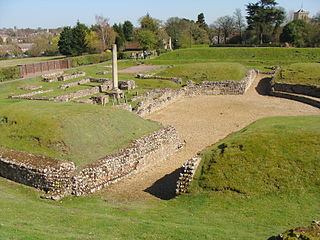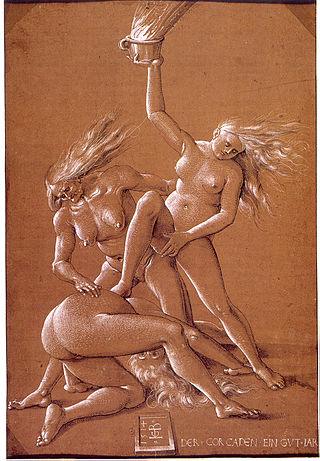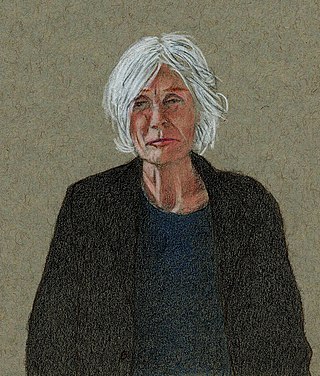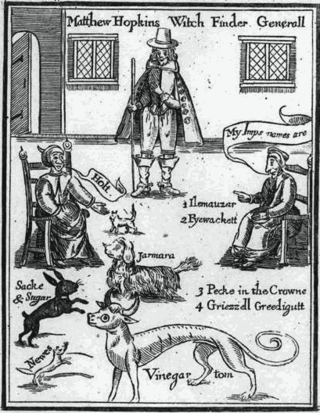
The Malleus Maleficarum, usually translated as the Hammer of Witches, is the best known treatise purporting to be about witchcraft. It was written by the German Catholic clergyman Heinrich Kramer and first published in the German city of Speyer in 1486. Some describe it as the compendium of literature in demonology of the 15th century. Kramer blamed women for his own lust and presented his views as the Church's position. The book was condemned by top theologians of the Inquisition at the Faculty of Cologne for recommending unethical and illegal procedures, and for being inconsistent with Catholic doctrines of demonology.

Drama was introduced to Britain from Europe by the Romans, and auditoriums were constructed across the country for this purpose.

Zsuzsanna Emese Mokcsay is a Hungarian-American writer, activist, playwright and songwriter living in America who writes about feminist spirituality and Dianic Wicca under the pen name Zsuzsanna Budapest or Z. Budapest. She is the founder of the Susan B. Anthony Coven #1, which was founded in 1971 as the first women-only witches' coven. She founded the female-only style of Dianic Wicca.
A political drama can describe a play, film or TV program that has a political component, whether reflecting the author's political opinion, or describing a politician or series of political events.

Top Girls is a 1982 play by Caryl Churchill. It centres on Marlene, a career-driven woman who is heavily invested in women's success in business. The play examines the roles available to women in old society, and what it means or takes for a woman to succeed. It also dwells heavily on the cost of ambition and the influence of Thatcherite politics on feminism.

Cloud Nine is a 1979 British two-act play written by British playwright Caryl Churchill. It was workshopped with the Joint Stock Theatre Company in late 1978 and premiered at Dartington College of Arts, Devon, on 14 February 1979.

European witchcraft is a multifaceted historical and cultural phenomenon that unfolded over centuries, leaving a mark on the continent's social, religious, and legal landscapes. The roots of European witchcraft trace back to classical antiquity when concepts of magic and religion were closely related, and society closely integrated magic and supernatural beliefs. Ancient Rome, then a pagan society, had laws against harmful magic. In the Middle Ages, accusations of heresy and devil worship grew more prevalent. By the early modern period, major witch hunts began to take place, partly fueled by religious tensions, societal anxieties, and economic upheaval. Witches were often viewed as dangerous sorceresses or sorcerers in a pact with the Devil, capable of causing harm through black magic. A feminist interpretation of the witch trials is that misogynist views of women led to the association of women and malevolent witchcraft.
Protofeminism is a concept that anticipates modern feminism in eras when the feminist concept as such was still unknown. This refers particularly to times before the 20th century, although the precise usage is disputed, as 18th-century feminism and 19th-century feminism are often subsumed into "feminism". The usefulness of the term protofeminist has been questioned by some modern scholars, as has the term postfeminist.
In the early modern period, from about 1400 to 1775, about 100,000 people were prosecuted for witchcraft in Europe and British America. Between 40,000 and 60,000 were executed. The witch-hunts were particularly severe in parts of the Holy Roman Empire. Prosecutions for witchcraft reached a high point from 1560 to 1630, during the Counter-Reformation and the European wars of religion. Among the lower classes, accusations of witchcraft were usually made by neighbors, and women made formal accusations as much as men did. Magical healers or 'cunning folk' were sometimes prosecuted for witchcraft, but seem to have made up a minority of the accused. Roughly 80% of those convicted were women, most of them over the age of 40. In some regions, convicted witches were burnt at the stake.
"The After-Dinner Joke" is the 17th episode of eighth season of the British BBC anthology TV series Play for Today. The episode was a television play that was originally broadcast on 14 February 1978. "The After-Dinner Joke" was written by Caryl Churchill, directed by Colin Bucksey, produced by Margaret Matheson, and starred Paula Wilcox.

Caryl Lesley Churchill is a British playwright known for dramatising the abuses of power, for her use of non-naturalistic techniques, and for her exploration of sexual politics and feminist themes. Celebrated for works such as Cloud 9 (1979), Top Girls (1982), Serious Money (1987), Blue Heart (1997), Far Away (2000), and A Number (2002), she has been described as "one of Britain's greatest poets and innovators for the contemporary stage". In a 2011 dramatists' poll by The Village Voice, five out of the 20 polled writers listed Churchill as the greatest living playwright.
Monstrous Regiment Theatre Company is a British feminist theatre company established in 1975. Monstrous Regiment went on to produce and perform 30 major shows, in which the main focus was on women's lives and experiences. Performer-led and collectively organised, its work figures prominently in studies of feminist theatre in Britain during the 1970s and 1980s. No productions have been mounted since 1993, when financial support from the Arts Council of Great Britain was discontinued.
Love and Information is a play written by the British playwright Caryl Churchill. It first opened at the Royal Court Theatre in September 2012. It received many positive reviews from critics.
Gillian Hanna was an Irish stage, film, TV and voice actress. She founded the feminist Monstrous Regiment Theatre Company about which she wrote a book that was published in 1991.
Owners is a 1972 play by British playwright Caryl Churchill. It was first performed at the Royal Court Theatre's Theatre Upstairs in a production directed by Nicholas Wright. The play is a satire of property rights about real estate and of the people who own real estate and those who live in rented accommodation.
Feminist theater grew out of the wider Political theater of the 1970s, and continues to the present. It can take on a variety of meanings, but the constant thread is the lived experience of women.
Fen is a 1983 play by Caryl Churchill. While not as well known as Churchill works like Cloud 9 (1979) and Top Girls (1982), it has been praised by many critics.

In England, witch trials were conducted from the 15th century until the 18th century. They are estimated to have resulted in the death of perhaps 500 people, 90 percent of whom were women. The witch hunt was at its most intense stage during the English Civil War (1642–1651) and the Puritan era of the mid-17th century.
Jenny McLeod is a British playwright. McLeod grew up in Nottingham. She started writing plays in the middle of her A Levels after seeing an advertisement in a local paper. Her play Cricket at Camp David won the Writing 87 workshop, and she went on to write Island Life for Monstrous Regiment Theatre Company. In 1991–2 she was writer-in-residence at the Nottingham Playhouse in 1991–1992. After winning a bursary from Thames Television, she was in residence at the Tricycle Theatre in 1995.

This is a chronological list of women playwrights who were active in England and Wales, and the Kingdom of Great Britain and Ireland before approximately 1800, with a brief indication of productivity. Nota Bene: Authors of dramatic works are the focus of this list, though many of these writers worked in more than one genre.)








